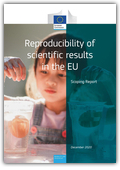It is already almost a year old but in case you would have missed it, I encourage the reading of this well written report on the Reproducibility of scientific results in the EU.

This report scopes the issue of the reproducibility of scientific results, based on a field review and on an expert seminar on the opportunity of policy action in Europe. As such, it aims to increase the European Commission’s understanding of the lack of reproducibility in Europe, and help design a suitable response in the context of EU Research & Innovation. The report identifies the key emerging issues in reproducibility; it is informed by clearly marked expert opinion (in italics), as it emerged from the scoping seminar. Concrete recommendations of possible action by the European Commission are featured in separate ‘Action Boxes’. Overall the report introduces the concept of reproducibility as a continuum of practices. It is posited that the reproducibility of results has value both as a mechanism to ensure good science based on truthful claims, and as a driver of further discovery and innovation. The sections includes a working definition that is conducive for policy making and thus delimits the scope of the subject. Then the report reviews recent claims regarding the increasing lack of reproducibility in modern science, dubbed by some a ‘crisis of reproducibility’. It explores the main traits and underlying causes of the lack of reproducibility, including bias, poor experimental design and statistics, issues with scientific reporting, research culture, career-related factors and economics. Finally, the report reviews recent activities by scientists, research funders and publishers that aim to mitigate the lack of reproducibility; and it catalogues a range of possible remedies to the lack of reproducibility as they are found in the literature. The report provides concrete advice for policy action that may increase reproducibility in three key areas of the EU Research & Innovation, specifically guidelines; the research grant system; and training and careers